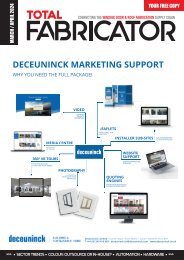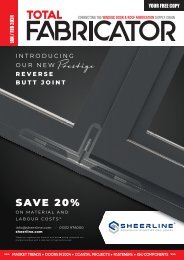Total Installer May-June 2019
You also want an ePaper? Increase the reach of your titles
YUMPU automatically turns print PDFs into web optimized ePapers that Google loves.
SPONSORED BY<br />
7 REGULAR CHECKS FOR YOUR VAN<br />
By Charles Stubbings, Account Manager, Moneybarn.<br />
For the majority of van owners, a commercial vehicle is key to trade and having it off the road takes<br />
its toll on business. With that in mind, Moneybarn has put together seven important maintenance<br />
checks you can carry out to keep your van on the road.<br />
“Tyres must be inflated<br />
to the manufacturer’s<br />
specification for the<br />
weight of the load”<br />
1Tidy tyres LCV tyres, like car tyres, must<br />
have a minimum 1.6mm of tread. Bald<br />
tyres not only increase the likelihood of an<br />
accident due to less grip but could also keep you<br />
off the road while you find a spare.<br />
Tyres must be inflated to the vehicle<br />
manufacturer’s specification for the weight of the<br />
load, so refer to your handbook to find the right<br />
pressure for your van.<br />
Under-inflated tyres generate more heat from<br />
friction, causing more wear and tear to the tyres<br />
and impacting fuel consumption. Similarly, overinflated<br />
tyres cause premature wear on the centre<br />
of the tyre.<br />
2Under the bonnet Before you open the<br />
bonnet, check underneath your van for any<br />
leaks. Under the bonnet, check the oil,<br />
water/coolant, power steering fluid, brake fluid<br />
and windscreen washer fluid. Perform these<br />
checks weekly and before any long journey.<br />
After the fluids, take a look at the battery. Check<br />
the condition of the terminals and cables for any<br />
signs of cracking, breaking or built-up residue. If<br />
you notice any of these, book your van in with a<br />
mechanic as soon as possible.<br />
3Door check A van is broken into every 23<br />
minutes in the UK, so it’s crucial your<br />
doors lock and close properly.<br />
Van doors are subject to wear and tear every day,<br />
being pulled open and slammed shut multiple<br />
times at each job. During a routine walk around,<br />
you should check all doors can be opened and<br />
closed properly and with ease. Test the rear doors<br />
by opening them fully and if your van has a side<br />
door, check it stays on its runners when it opens<br />
and closes.<br />
4Light it up It’s a legal requirement to have<br />
all lights on your van working properly.<br />
Routinely walk around your van and test<br />
they’re all working. For your brake lights, you’ll<br />
need another person to help you.<br />
If you notice a light isn’t working correctly, you’ll<br />
need to replace the bulb. However, if this doesn’t<br />
work, it could be a wiring issue – in which case,<br />
you’ll need to take the vehicle to a garage to fix<br />
the problem. LCV owners should also make sure<br />
lights are clean, as dirty lights or those with<br />
reduced visibility can impact your driving and that<br />
of those around you.<br />
5Stay visible Windscreen wipers must be<br />
able to clear the windscreen effectively. If<br />
they leave streaks or squeak when passing<br />
over the windscreen, it means they’ve become<br />
worn and need to be replaced.<br />
You should also check for any chips or cracks in<br />
the windscreen. Even a tiny bit of damage could<br />
end up cracking the whole screen, which is<br />
incredibly dangerous while driving.<br />
6Keep it clean It’s recommended you wash<br />
your van at least once a month to avoid<br />
any permanent damage or staining to the<br />
paintwork. Keeping it clean will also reduce the<br />
likelihood of rust appearing. Although it won’t help<br />
your van’s performance, having a clean exterior<br />
also provides the professional image you want to<br />
project to customers.<br />
7And finally… You should be aware of your<br />
van’s gross and axle weight limits.<br />
Remember the total vehicle weight<br />
includes the combined weight of the driver,<br />
passengers, load and fuel. Not only is loading an<br />
LCV above its weight limit illegal, but it also<br />
causes excessive wear and tear on the van and<br />
undue strain on tyres. This increases the risk of<br />
tyre failure, resulting in downtime for repair.<br />
Regularly serviced and maintained vehicles<br />
should breakdown less often but consider making<br />
these checks regularly for LCVs that work offroad,<br />
perform high mileage or are subject to<br />
extreme conditions.<br />
Contact Moneybarn<br />
0330 555 1230<br />
www.moneybarn.com/van-finance/<br />
@MoneybarnUK<br />
76 TIJULY/AUG <strong>2019</strong> PRACTICAL CONTENT FOR THE GLAZING INSTALLER & HOME IMPROVEMENT SPECIALIST

















